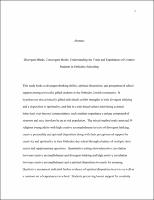Please use this identifier to cite or link to this item:
https://hdl.handle.net/20.500.12202/6624| Title: | Divergent minds, convergent molds: Understanding the traits and experiences of creative students in Orthodox schooling |
| Other Titles: | מחשבות שונות, תבניות מתכנסות: הבנת התכונות והחוויות של סטודנטים יוצרים בלימודים אורתודוכסים |
| Authors: | Pelcovitz, David A. Salomon, Laya Shawn, Karen Roda, Jessica Walkenfeld, Faye F. Gamliel, Miriam Leah Droz, Marlana Ruth |
| Keywords: | gifted education spirituality religious education at risk creativity divergent thinking Orthodox Judaism search for meaning talent |
| Issue Date: | Jan-2021 |
| Citation: | Droz, Marlana Ruth. (2021, January). Divergent minds, convergent molds: Understanding the traits and experiences of creative students in Orthodox schooling. (#28317828). [Doctoral dissertation, Yeshiva University]. ProQuest Dissertation Publication. |
| Abstract: | This study looks at divergent thinking ability, spiritual disposition, and perception of school support among artistically gifted students in the Orthodox Jewish community. It hypothesizes that artistically gifted individuals exhibit strengths in both divergent thinking and a disposition to spirituality, and that in a rule-based culture prioritizing external behavior over internal connectedness, such students experience a unique compound of stressors and may therefore be an at-risk population. The mixed-method study assessed 54 religious young adults with high creative accomplishment in traits of divergent thinking, creative personality and spiritual disposition along with their perceptions of support for creativity and spirituality in their Orthodox day school through a battery of multiple short scales and supplementary questions. Quantitative testing showed positive correlation between creative accomplishment and divergent thinking and high positive correlation between creative accomplishment and a spiritual disposition to search for meaning. Qualitative assessment indicated further evidence of spiritual disposition in artists as well as a common set of experiences in school. Students perceiving lowest support for creativity experienced feelings of marginalization, lack of appreciation for strengths, and a likelihood toward giftedness. Environmental support for spirituality was low in multiple areas, including minimal opportunities to speak about G-d, minimal time for introspection, inconsistent role modeling in teachers, and, directly impacting students with strong disposition to search for meaning, weak focus on the meaning behind practices. Trait correlation results and qualitative data can help educators better understand creative students, and school environment findings indicate several areas that would benefit from change to increase positive outcomes for creative students in Orthodoxy. |
| Description: | Doctoral Dissertation, Ed.D., Azrieli Graduate School of Jewish Education & Administration, Open Access |
| URI: | https://hdl.handle.net/20.500.12202/6624 https://ezproxy.yu.edu/login?url=https://www.proquest.com/dissertations-theses/divergent-minds-convergent-molds-understanding/docview/2525649686/se-2?accountid=15178 |
| Appears in Collections: | Azrieli Graduate School of Jewish Education & Administration: Doctoral Dissertations |
Files in This Item:
| File | Description | Size | Format | |
|---|---|---|---|---|
| M. Droz (aka Miriam Gamliel) Final Dissertation.pdf | 3.01 MB | Adobe PDF |  View/Open |
This item is licensed under a Creative Commons License

